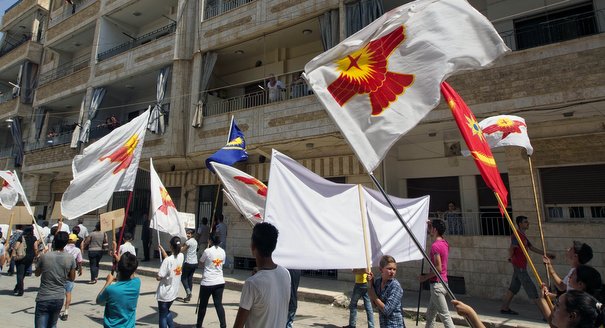The Christians in Qamishli, in Syria’s far northeast, are a diverse group. There are eleven churches in the city: four Syriac Orthodox, two Assyrian, one Roman Catholic, one Chaldean Catholic, one Armenian Catholic, one Armenian Apostolic, and one Protestant. In terms of ethnicity, most Christians here are Syriacs, in an area otherwise populated by Kurds and Arabs.
Many of Qamishli’s Christians no longer see a future in the country, torn apart by war, religious strife, and economic collapse. Those who can will sell their homes to pay the $1,000 fee for a smuggler to take them to Europe; others go to Turkey or Lebanon. Those who stay will inevitably suffer the consequences, sinking from middle class to poor, or from poor to destitute.
The economy is in shambles. Prices for food and fuel have multiplied. To name but one example, a large cooking gas cylinder would previously sell for the fixed price of 400 Syrian pounds, but now it costs ten times as much on the black market. That’s equal to one-third of the monthly salary for an ordinary worker.
Offsetting Civil Conflict
While some Christian inhabitants leave the city to go abroad, others arrive in Qamishli as internal refugees. They are fleeing the war that rages in places like Aleppo, Homs, Deir ez-Zor, and Raqqa, where their villages or neighborhoods have been devastated by fighting or overtaken by radical Islamist groups. Many Kurds and Arabs also come here to seek refuge, adding to the strain on available resources. Common to displaced people from all groups is that they often have to turn to family or ethnic networks to survive.
“Before 2011, the Arabs were relying on the regime and the Kurds and the Syriacs on themselves,” says Kino, twenty-three years old, a dentistry student before the war. He is now a full-time activist in the Syriac Union Party. “Relations between all three groups have now developed in two directions simultaneously. Firstly, there is even closer solidarity within the group. Secondly, it has proved necessary to develop more connections between the groups. Unlike in other Syrian cities, people here still have a village mentality and act collectively. That is why we have been able to keep the peace.”
The problems they have to deal with are not all about security or politics. Local committees have sprung up on every neighborhood block to organize things like garbage collection and the distribution of food for the poor.
George Qriaqes is the chairman of the Barmaya Center for Syriac Culture and Arts. He tells me that the center has run a youth club for Syriacs, Kurds, and Arabs since the unrest started in 2011. Some of them are originally from Qamishli, others come from displaced families. During the last two summers they have organized a summer camp where the youth could meet every day. “We want to teach them to live together and accept each other,” says Qriaqes.
A Syriac Cultural Awakening
While most people are simply struggling with their daily lives, some are preparing for the future. As they do not trust either the regime or the opposition to create the secularist and pluralist society they want for themselves, Syriac activists are mobilizing for a national awakening of their people. While the regime granted them religious rights as Christians, Qriaqes and others want the Syriacs to be recognized as a national group with the right to use their own language, Neo-Aramaic.
“We have given a lot of cultural contributions to the world and can still give more, but right now we do not develop or improve our culture, we are only trying to survive,” says Qriaqes. In addition to the direct physical threats of kidnappings, regime oppression, and attacks by radical Islamist groups, he sees emigration as the greatest threat to the cultural survival of the Syriac community.
If the remaining regime presence in Qamishli is ousted, it will most likely be by the hand of the Kurdish militias. While Kurds and Syriacs generally share good relations, Qriaqes voices some concerns about the place of his people within the framework of a possible future Kurdish region in northern Syria: “We have not achieved anything if we simply change from ‘Arabistan’ to ‘Kurdistan’—we do not want them to ‘Kurdicize’ the country like it was ‘Arabized’ before.”
This is the first report by Swedish journalist Carl Drott from Qamishli. Part two, click here.






